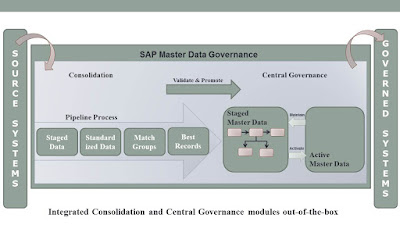SAP MDG Overview
SAP MDG is a best in
class master data management solution, giving out-of-the-box, space particular
master data governance to centrally create, change and circulate or to unite
master data over your entire endeavor system landscape.
The MDG9.0 on SAP HANA 1.0 conveys arrangements in the accompanying territories:
• SAP MDG for financial
data (financial accounting/consolidation data, organizations, benefit and cost
focuses)
• SAP MDG for supplier
data (corporate, organization, and purchasing related data, accomplice
functions)
• SAP MDG for client
data (corporate, organization, and sales related information, accomplice
capacities)
• SAP MDG for material
data (corporate, sales organization, storage, valuation, warehouse, costing
data, and plant)
• SAP MDG for
enterprise asset management data (functional location data, MRO bills of
material, equipment)
• Master data
consolidation (Load, institutionalize, match and calculate best records for
business partner master data, material master data)
The motivation behind
this framework is to permit SAP clients and accomplices to assess and begin
Mater Data Governance across domain solutions.
Governance:
Enables governance, consistency, and straightforwardness of master data amid
creation and change through incorporated arranging, endorsement, and central
audit trail.
Consistency:
Delivers reliable definition, approval, and replication of key master data
elements. Disposes of blunder inclined manual maintenance processes for master
data in various frameworks.
Consolidation:
Consolidate master data in any venture framework landscape, make best records
and key mapping amongst duplicates, and alternatively join combination with
central governance for maintained master data quality.
Integration:
Provides local coordination in SAP solutions, incl. re-utilization of the data
model, business rationale, and design for approval while offering receptiveness
to integrate 3rd party services.
Flexibility:
Open to stretch out the standard models and to make governance for your own
master data and adaptable for non-SAP environments.
Data
Quality: Measure process quality using SAP Smart Business
and coordinate with SAP Data Services and Information Steward for quality,
improvement, and remediation.
SAP Master Data Governance Capabilities
Deliver Out-of-the-Box
Low TCO:
Full Integration to SAP Systems as a client Offer integration services for
non-SAP client structures
Flexibility:
Workflow flexibility immovably planned to a structure for describing business
rules
Simplicity of Consumption:
Deliver a procedure driven solution,
with roles and web-based UI Deliver predefined data quality organizations
Best Practice:
Deliver a data model exhibited by a couple of uses
and ventures
Process Transparency:
Reuse of existing planning logic
Integration:
Out-of-the-box data replication mechanisms, using stable systems.
Introduction to Data Modeling in SAP MDG
A key part of governing
master data is the capacity for all parts associated with the end-to-end
governance process to control data cooperatively in an arranging situation.
Henceforth, a division is required between data that are as of now being
utilized or prepared to be utilized in transactions and data that are
associated with a governance procedure. There are two storage territories with
regards to SAP MDG as takes after:
• Staging region
Contains data as of now
in a governance procedure and has a related change ask.
• Active zone
Contains data prepared
to be devoured by different applications or prepared to be conveyed to
different frameworks. In the accompanying segments, we start with the means to
make or change master data to comprehend the idea of progress demands and
staging data versus active data.
We at SAPVITS offer SAP MDG Online Training for fresher’s and working people with real time scenarios and
industry experts. SAP MDG Course includes Introduction
to MDG, Data Modelling, Entity Types, Active Area & Reuse area, Attributes
& Properties, Relationships and its types, Generated Data Model, Extending
Standard Data Model, SMT Mapping, Creation of Custom Data Model, UI Modelling, UIBB
Configuration, Data Quality, BRF+ Validations and Derivations, BADIs
Validations and Derivations, Process Modelling, Change Requests, Rule Based
Workflow Configuration, Data Replication, Bulk Loads.
For more courses like SAP FICO Training Chicago, SAP TM Training in Bangalore and SAP SimpleFinance Training in Chennai, SAP IDM Training in Hyderabad, SAP EWMTraining in USA, SAP HANA Administration Training in Bangalore, SAPSuccess Factors Online Training in Mumbai, SAP Simple Logistics Online Training in Bangalore contact us.
Contact us:
Website: http://www.sapvits.com/
Email Id: info@sapvits.com
IND: +91 992 284 8898
USA: +1 678 389 8898
UK: +44 141 416 8898


Whatever we gathered information from the blogs, we should implement that in practically then only we can understand that exact thing clearly, but it’s no need to do it, because you have explained the concepts very well. It was crystal clear, keep sharing..
ReplyDeleteWhatever we gathered information from the blogs, we should implement that in practically then only we can understand that exact thing clearly, but it’s no need to do it, because you have explained the concepts very well. It was crystal clear, keep sharing..
success factors training